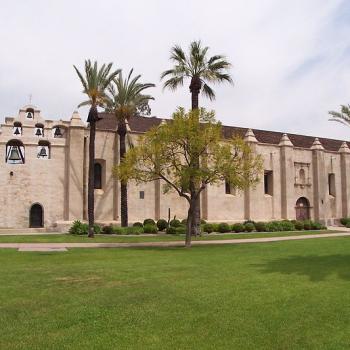You rose to prominence partly through your critique of the Religious Right, a critique made in places like The Soul of Politics and God's Politics. The Religious Right, in your view, became apologists for the Republican party. The question may seem silly, but I want to hear your answer to it: What's wrong with that model of Christian political engagement?
It's always a mistake to be in the back pocket of a political party, to make your religion partisan, to be a power broker within a political party. That's always a mistake, Right or Left. There was no prophetic engagement. And their selection of issues wasn't big enough. Let's be honest. The Bible says very little about homosexuality. We found two thousand verses in the Bible about poverty -- yet homosexuality was the issue of the Religious Right, and poverty was not. There was not a biblical selection of issues.
I'm opposed to abortion too, which is why I'm not part of the Left. But they were pro-life only on abortion, and not on nuclear weapons or the death penalty. They weren't really pro-life at all; they were just anti-abortion. That was not a biblical stance. It was an anti-abortion stance, but not a pro-life stance. So it was a narrow selection of issues that was not true to a biblical vision of what God cares about.
You say it's dangerous for the Left and the Right to become apologists for a political party. Now that there is a Religious Left, and a Democratic administration in power, are you concerned those same mistakes are being made on the Left?
Well, there isn't a very big Religious Left. The new evangelical generation is not Religious Left. Journalists and the media are sloppy; if they see something that is not on the Right, they conclude that it must be Left.
I've been in meetings at the White House with evangelicals across the spectrum. We worked together on the issue of immigration reform. We're united on that issue. Some are Republicans and some are Democrats. I have had meetings with the administration, with the House Speaker, with all kinds of Democratic leaders, and with a broad spectrum of religious leaders, all of whom care about climate change, care about the environment, care about poverty. So the issues that concern us are those issues: human rights, Darfur, trafficking, war and peace. Those are not Left/Right categories because the new evangelical generation is not pro-abortion. The Left is, and the new evangelical generation is not. They're also traditional in their view of sexuality and family. They hold a covenantal view of sexuality, and the Left by and large holds a recreational view of sexuality. So, there are real differences.
There is a small mainline Protestant Left. Can it make the same mistakes? Of course it can. I have said just recently that all Washington cares about is access. They're just after access. For most people that's enough, to get access. To have your calls returned; to get invited to meetings; to be on conference calls. We should never be satisfied with access. We need to be satisfied only with results.
Thirty thousand kids are still dying every day. That hasn't changed. We still have kids dying in Afghanistan every day, for a needless, senseless, and immoral war. That hasn't changed. We're still growing more deeply into poverty in this country. So without change, without metrics, without outcomes, access is very seductive. Parties on both sides want to co-opt religious people to be their supporters. There needs to be a prophetic voice always on behalf of the poor, the innocent, and the victims.
That's our role. To be an independent prophetic voice on behalf of those who are always left out of politics. Politicians talk about the middle class; they never talk about the poor. Democrats don't talk about the poor; the White House doesn't talk about the poor. It's about the middle class; it's about voters. So our job is to talk about people who have been left behind. That's our job.
Have you had the opportunity, publicly and privately, to have that prophetic voice within this administration? In regards to Afghanistan . . .
Yes, if you've read what I've said: it's wrong. It's an immoral, ineffective, stupid war. I've said that publicly and privately. They're killing American kids. And I've said more recently, when you walk by the Vietnam Memorial Wall, you realize that most of those kids died after we knew the war wasn't winnable -- and we kept going anyway.
Now, this war is not winnable. Everyone knows that. And someday we're going to quit. In the meantime, a lot of American kids and a lot of kids in Afghanistan are going to die. It's wrong. Both parties have sold out.
I want to give you an opportunity to respond to a criticism. There was recently an article by Marvin Olasky of World Magazine in which you were challenged, in spite of your professions of non-partisanship, to confess that you are a member of the Left. How do you respond to that?





